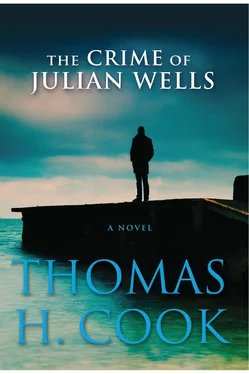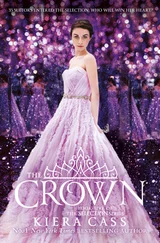Thomas Cook - The Crime of Julian Wells
Здесь есть возможность читать онлайн «Thomas Cook - The Crime of Julian Wells» весь текст электронной книги совершенно бесплатно (целиком полную версию без сокращений). В некоторых случаях можно слушать аудио, скачать через торрент в формате fb2 и присутствует краткое содержание. Год выпуска: 2012, ISBN: 2012, Издательство: Grove Press, Жанр: Криминальный детектив, на английском языке. Описание произведения, (предисловие) а так же отзывы посетителей доступны на портале библиотеки ЛибКат.
- Название:The Crime of Julian Wells
- Автор:
- Издательство:Grove Press
- Жанр:
- Год:2012
- ISBN:9780802194589
- Рейтинг книги:5 / 5. Голосов: 1
-
Избранное:Добавить в избранное
- Отзывы:
-
Ваша оценка:
- 100
- 1
- 2
- 3
- 4
- 5
The Crime of Julian Wells: краткое содержание, описание и аннотация
Предлагаем к чтению аннотацию, описание, краткое содержание или предисловие (зависит от того, что написал сам автор книги «The Crime of Julian Wells»). Если вы не нашли необходимую информацию о книге — напишите в комментариях, мы постараемся отыскать её.
The Crime of Julian Wells — читать онлайн бесплатно полную книгу (весь текст) целиком
Ниже представлен текст книги, разбитый по страницам. Система сохранения места последней прочитанной страницы, позволяет с удобством читать онлайн бесплатно книгу «The Crime of Julian Wells», без необходимости каждый раз заново искать на чём Вы остановились. Поставьте закладку, и сможете в любой момент перейти на страницу, на которой закончили чтение.
Интервал:
Закладка:
The answer to those questions now lay with my father.
He looked much weaker than when I’d last seen him, and in the flesh, rather than on a computer screen, he seemed far more frail.
“Ah, Philip,” he said. “Welcome home.”
He was sitting in his chair when I arrived, as upright as possible, and as he watched me settle into the chair that faced him, his mood seemed one of cheerful expectation.
“So,” he said, “tell me about your adventures.”
All my life I had wanted him to be eager to hear my tale. All my life I had felt somewhat inadequate for never having one to tell him. Now the one I brought him was incomplete, with missing pieces he alone could provide.
“Well?” my father said eagerly. “You must surely have some stories.”
I felt like a man who had reached the final chapter of a book he had been reading for a long time, one of those vast nineteenth-century tomes in which many fates shift and veer, only to reach what in the last pages seems to be their predestined ends.
“Yes, I do,” I said quietly.
Then, like a wily cop in a bleak interrogation room, I laid the groundwork for what was to come. I offered a brief summation of the route I’d traveled, through Julian’s books, then on to the places I’d gone and the people I’d met, first Rene and Oradour, then on to Irene in Budapest and Soborov in Rostov, a trail that finally wound its way back to Argentina, where I’d confronted El Arabe in a little house tucked into a corner of Paraguay near Iguazu Falls.
The last of my tale had taken me to the brink, but I found that I could not cross it, and only said, “He was a cruel man, El Arabe.”
“They come out of the woodwork in a place like Argentina during a time like the Dirty War,” my father said. He appeared to grow somber for a moment, then, by act of will, to lift his own heavy spirits. “But you’ve had quite a time of it,” he said. “Travel to exotic locales. Talks with various odd ducks, even a Russian spy. It’s like the books I used to read.”
“A lot can be learned from those books, I suppose,” I said, rousing myself for another reluctant effort to confront my father. “Deception, for one. False identities and wrong turns. That one may smile and smile and be a villain.” I paused, then added, “That goodness is evil’s best disguise. Julian said that. In fact, it was the last thing he said.”
My father stared at me silently for a moment, then said with perfect calm, “What do you suppose he meant by that?”
“I don’t know,” I said, now moving with small steps toward the trapdoor, the steps beneath it, “but I think it was something he learned in Argentina.”
“Yes, he did change after that.” His gaze dropped to his hands, then lifted slowly up toward me. “That girl who disappeared.”
“Marisol,” I said.
The trapdoor opened and I took one step down.
“We found out what happened to her, you know,” I told my father. “She was arrested by the junta. She was tortured, then killed.”
“I thought as much,” my father said.
“But we never found out why,” I said as I made my slow descent. “She wasn’t political after all. That much is clear. She was just a girl from the country.”
My father said nothing, but I thought I saw a sad glimmer in his eyes, and with that I made the rest of my journey down.
“Julian thought it was his fault,” I said. “He blamed himself for her death.”
“Why?”
“I don’t know,” I answered. “And when I tried to get that particular answer from El Arabe, he said I should ask you.”
My father’s body tensed. “Me? Why would he say that?”
“I don’t know that either,” I told him.
He looked at me closely. “But you think I know, don’t you, Philip?”
When I didn’t answer, he sat back slightly, as if some invisible interrogator had pushed him.
“Do you think I was working for the junta, Philip?” he asked. “That I was one of their agents? Because I’d have to have been one, wouldn’t I, in order to know why Marisol was killed?”
“I suppose you would have, yes,” I admitted.
“Is that what you think?” my father demanded sharply.
“I only know that Julian blamed himself,” I said, “and that when I tried to find out why, El Arabe-”
“Pointed his finger at me,” my father interrupted. “Yes, you said that, Philip.”
He was clearly offended, and in the grip of that offense, he lifted his head like a proud but wounded warrior and glared at me.
“Do you know why she was killed?” I asked flatly.
“No, I don’t,” my father answered sternly. “How could I?” His eyes sparkled with affront. “I was nothing!” he cried. “You may have some fantasy that I was the puppet master in Argentina and that Julian was-what? — my pawn?” A hot breath blasted from him. “But I was nothing! I have always been nothing. Why else would I have played that silly little trick with Julian?”
There are moments in life that resemble the sound of wood cracking beneath you, and I had reached such a moment.
“What trick?” I asked.
My father seemed caught in a seizure of self-loathing. “Passed over and passed over. Again and again.”
“What trick, Dad?”
“The butt of jokes,” my father hissed vehemently.
“What silly little trick with Julian?” I demanded more firmly.
“Like some character in a novel,” my father raged on. He paused for a long moment, drew in a smoldering breath, then stared at me coldly. “But life is not a novel, Philip. Do you know why?”
“Because people die,” I said, paused a single, lethal second, then added, “especially people like Marisol.”
My father’s expression suddenly turned grave. “What are you talking about?” he asked. “Why do you keep going back to this girl?”
For the first time, he appeared to glimpse a dark shadow moving toward him, that pale rider we all fear, not the one that brings our death, but the one that brings the truth about our lives.
“What are you talking about, Philip?” he asked again, and it seemed clear to me that he honestly did not know.
“Something Julian once said just came back to me,” I answered. “A thought from Thoreau. That although the little boys kill frogs in play, the frogs die in earnest.”
My father stared at me silently, waiting, with some small but building hint of foreboding in his eyes.
I leaned forward slightly.
“Julian wanted to know why Marisol had been arrested,” I said. “He wanted to know what evidence they had that Marisol was anything but a young woman who was just a guide.” I paused, then released the arrow that contained all I knew. “El Arabe told Julian what that evidence was. It had come to Casa Rosada by way of an agent named Emilio Vargas. A double agent, actually, because Vargas was pretending to work for Casa Rosada, but in fact he was working for the Montoneros. He was also a friend of Marisol’s from childhood, from the Chaco. He was under surveillance when Marisol went to him. I saw a picture of them together, but I have no idea why she went to him, because evidently she hadn’t been in touch with him for many years.”
“Then suddenly she went to him?” my father asked.
“Yes.”
“When?”
“Not long after we met Father Rodrigo,” I answered. “I know it was right after that because in the picture she is wearing a bead necklace that Rodrigo gave her.”
I could see my father’s mind working desperately, though it seemed less in an effort to get off the road we were on than to move farther down it.
“Of course,” he said, as if some dark veil had torn. “Of course that’s what she did.”
For a moment, neither of us spoke. But during that time, though he said nothing, I saw a frightening change come over my father, saw the stony facade crumble, his mask fall away, so that he suddenly looked like what he was, a man in the act of loosening the cord that had bound his soul for so long.
Читать дальшеИнтервал:
Закладка:
Похожие книги на «The Crime of Julian Wells»
Представляем Вашему вниманию похожие книги на «The Crime of Julian Wells» списком для выбора. Мы отобрали схожую по названию и смыслу литературу в надежде предоставить читателям больше вариантов отыскать новые, интересные, ещё непрочитанные произведения.
Обсуждение, отзывы о книге «The Crime of Julian Wells» и просто собственные мнения читателей. Оставьте ваши комментарии, напишите, что Вы думаете о произведении, его смысле или главных героях. Укажите что конкретно понравилось, а что нет, и почему Вы так считаете.












